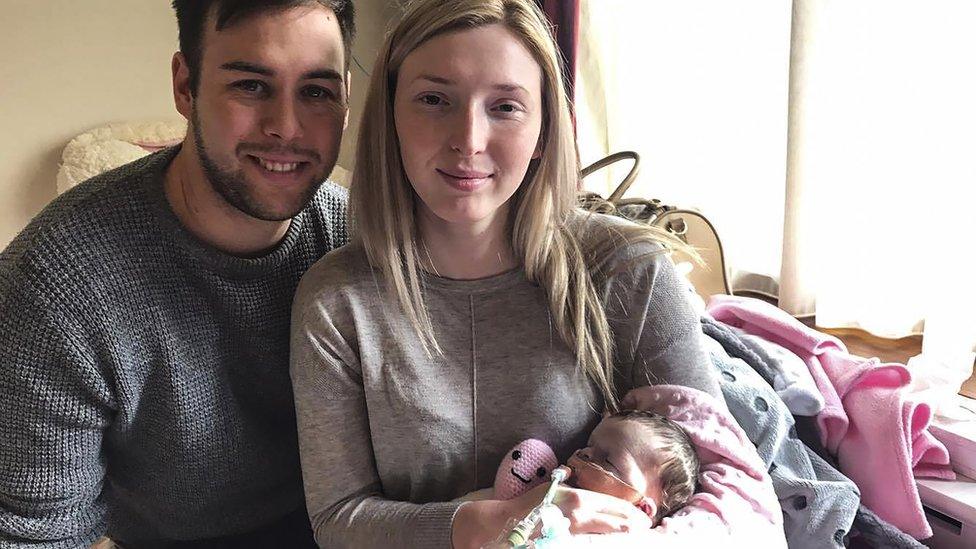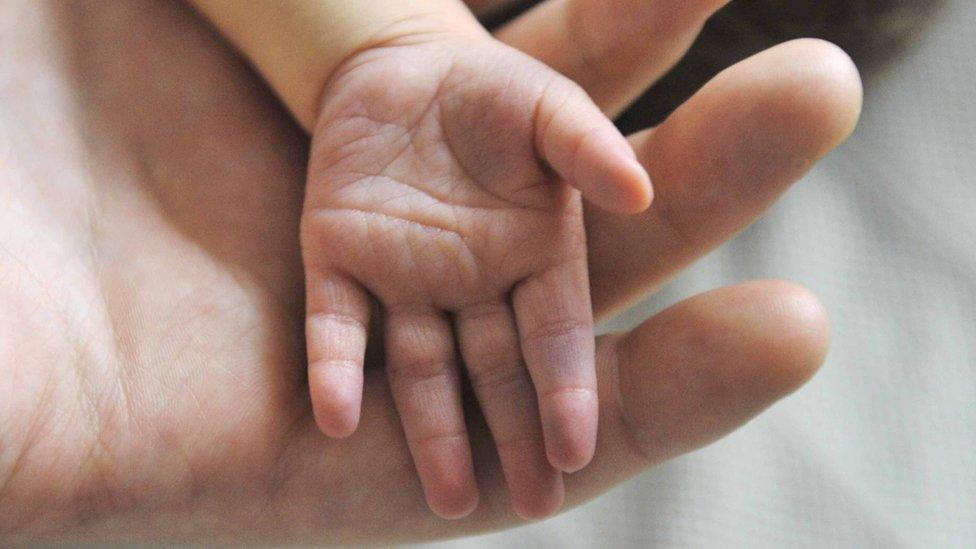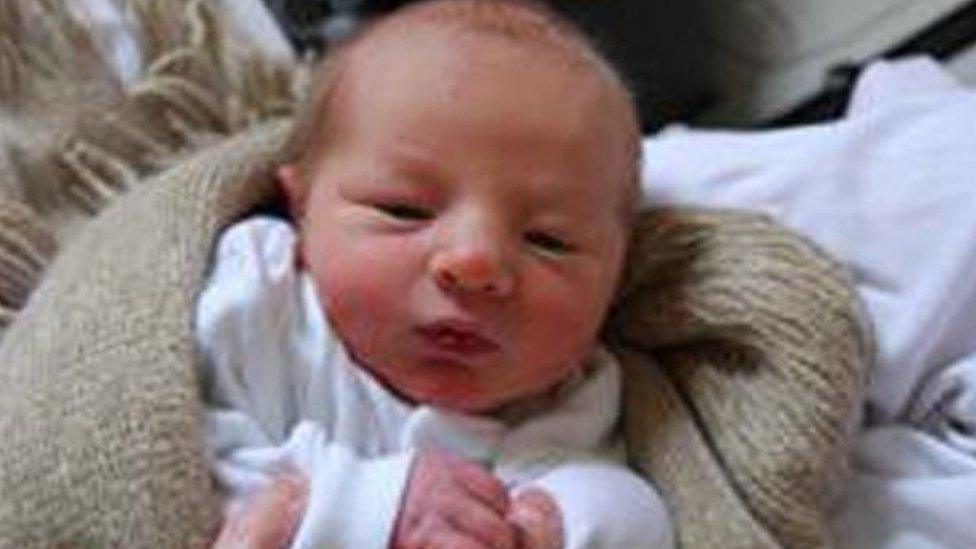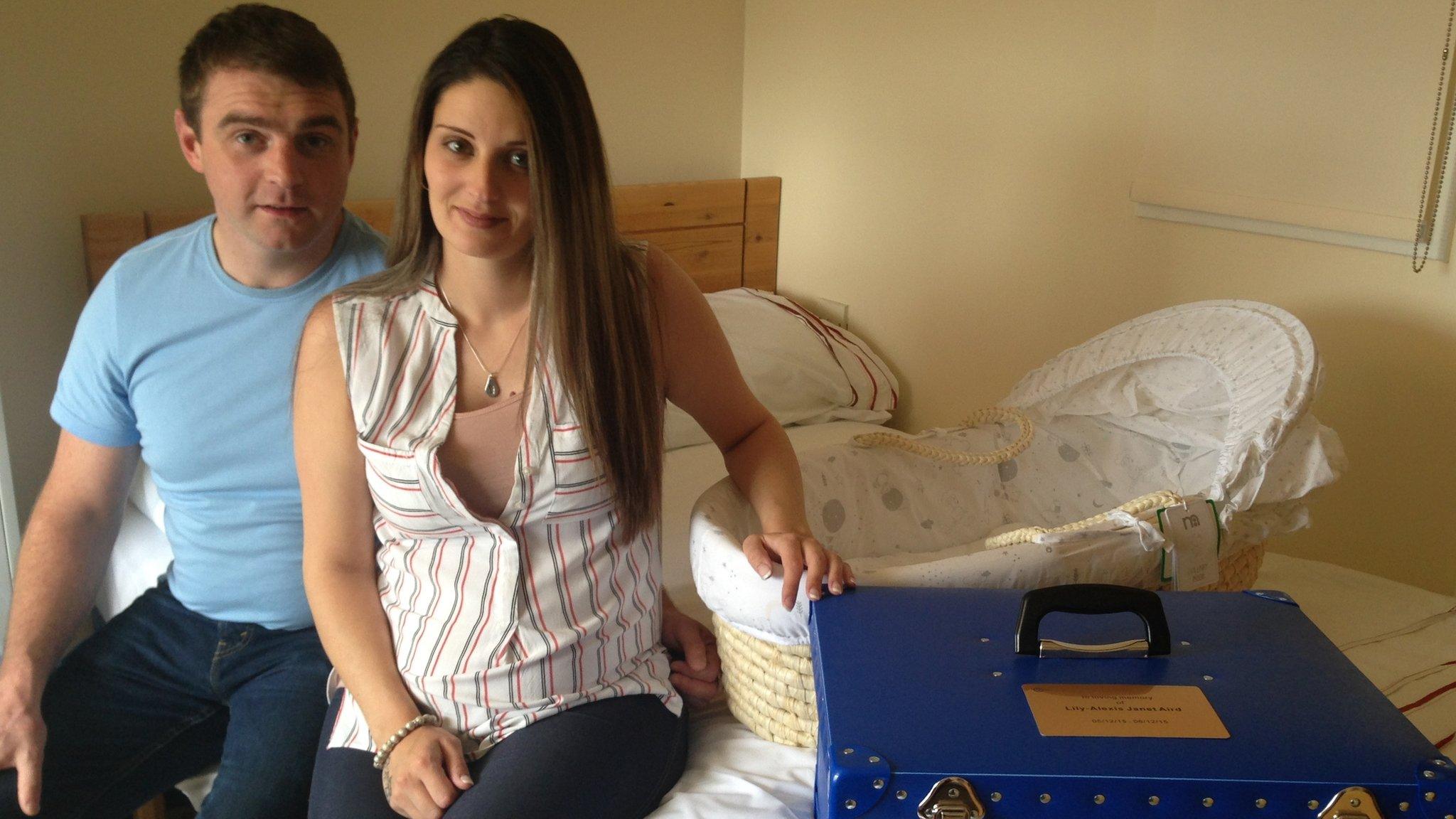The choices you have if your baby dies
- Published

Charlotte and Attila Szakacs, from York, spent 16 days with their daughter Evelyn after she died
Charlotte and Attila Szakacs only had four weeks with their daughter, Evelyn, before a rare chromosomal abnormality led to her death. Yet they were able to spend a further 16 days bonding with her before laying her to rest.
"I know it might not be the best option for everyone," Charlotte told the Daily Mail, external. "But for us it was so important to be able to have that family time and just properly cuddle our little girl."
For the Szakacs family, that option was a cuddle cot, enabling them to stay together for a longer period after Evelyn's death.
The cots are refrigerated Moses baskets that create a cool environment for the child's body.
By using it, Charlotte and Attila were able to stay in Martin House Children's Hospice, near Leeds, for 12 days, spending that time holding Evelyn, dressing her and even taking her for walks in a pram.
The couple then made the choice to take their baby home for another four days, before holding a funeral.
"I think having the time with her made such a difference," added Charlotte. "Being able to do so many of the things you imagine like taking her out in her pram, it really helped emotionally."
Creating memories
Although hospitals and hospices only began using them around five years ago, the cots have already made big impact on bereaved families.
"It helps them to create memories," says Dr Michelle Hills, consultant in paediatric palliative medicine at Martin House.
"Some families want to push their baby in the pram they have bought, take them home to the nursery they have prepared. For some, it helps them in the bereavement process."
Medical staff also offer parents the option of taking pictures of their baby, footprints and handprints, and creating memory boxes.
Getting these mementoes of their child can be important for some families to help them with the grieving process.
And for some parents, taking their child home after they die is another method of helping them to cope with their grief.

Where you can find help if you lose your baby
Sands, external - neonatal death and stillbirth charity
Bliss, external - special care baby charity
Baby Centre, external - a parent community
Care for the Family, external - national family support charity

But it is not one size fits all when it comes to something as traumatic as losing a child.
Dr Hills says the 16 days Charlotte and Attila decided to have was one of the longer periods she had come across, but the decision was up to each individual family.
"The important thing is there are choices available," she says. "Some people couldn't imagine taking their child home, some people want to stay in hospital, others want to use a hospice.
"It is absolutely devastating losing a child. We are there to help them with everything, from creating those memories to organising a funeral."
According to stillbirth and neonatal death charity Sands, 15 babies die every day either before, during or shortly after birth.
"That is 15 families all affected by that every single day," says Erica Stewart, bereavement support and awareness specialist for the charity. "People don't realise it is that number and we need to address that."
The charity echoes the words of Dr Hills, saying what is important is that each family gets to choose how they want to proceed when a child dies.
"It is the approach staff take too," she says. "If they approach a family, tell them something like a cuddle cot has helped others through that time, then it normalises it."
Beckie Wilson was able to spend three days with her son Carter, who died shortly after he was born.
But in some cases, funding makes it more difficult.
"There is an issue as you could find two babies who die on the same day, but there is only one cuddle cot and only one family has that option," says Ms Stewart.
"We have seen a number of families who have used cuddle cots go out afterwards and fundraise to make sure more are available."
But whatever families decide on in the immediate aftermath of the loss, the pain does not stop there.
Ms Stewart says: "A lot of parents feel isolated when they have lost a child and people are too worried to talk to them about it.
"They have not forgotten that child, it never goes away and we need to make sure we talk about it more.
"If you know someone who has lost their baby, drop them a text, give them a call, offer to do something for them like walk the dog or take their other kids to school. They will appreciate it."

How to help people who lose their baby...
Do listen to what parents say about their loss - a parent's love for their baby can not be measured in weeks or months
Do use the baby's name if they have chosen one
Do offer hugs to dads as well as mums, if it feels right to do so
Do get in touch to stop them feeling isolated
Don't avoid bereaved parents because you feel uncomfortable or awkward
Don't suggest what a bereaved parent should be feeling or doing. Everyone grieves in their own way
Don't stop supporting the parents after a few days or weeks
Don't assume that a new pregnancy or a new baby will cancel out the grief of the earlier loss.
Source: BabyCentre.co.uk

- Published13 October 2016

- Published10 October 2016

- Published2 July 2016
